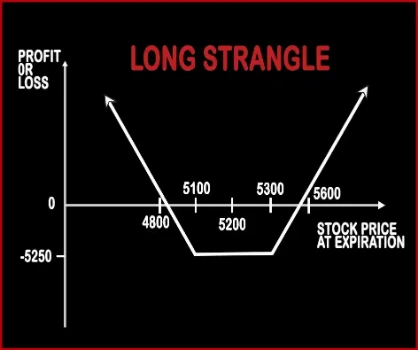Compare Strategies
| SHORT STRANGLE | LONG STRANGLE | |
|---|---|---|

|

|
|
| About Strategy |
Short Strangle Option StrategyThis strategy is similar to Short Straddle; the only difference is of the strike prices at which the positions are built. Short Strangle involves selling of one OTM Call Option and selling of one OTM Put Option, of the same expiry date and same underlying asset. Here the probability of making profits is more as there is a spread between the two strike prices, and if |
Long Strangle Option StrategyA Strangle is similar to Straddle. In Strangle, a trader will purchase one OTM Call Option and one OTM Put Option, of the same expiry date and the same underlying asset. This strategy will reduce the entry cost for trader and it is also cheaper than straddle. A trader will make profits, if the market moves sharply in either direction and gives extra-ordinary returns in the .. |
SHORT STRANGLE Vs LONG STRANGLE - Details
| SHORT STRANGLE | LONG STRANGLE | |
|---|---|---|
| Market View | Neutral | Neutral |
| Type (CE/PE) | CE (Call Option) + PE (Put Option) | CE (Call Option) + PE (Put Option) |
| Number Of Positions | 2 | 2 |
| Strategy Level | Advance | Beginners |
| Reward Profile | Limited | Unlimited |
| Risk Profile | Unlimited | Limited |
| Breakeven Point | Lower Break-even = Strike Price of Put - Net Premium, Upper Break-even = Strike Price of Call+ Net Premium | Lower Breakeven Point = Strike Price of Put - Net Premium, Upper Breakeven Point = Strike Price of Call + Net Premium |
SHORT STRANGLE Vs LONG STRANGLE - When & How to use ?
| SHORT STRANGLE | LONG STRANGLE | |
|---|---|---|
| Market View | Neutral | Neutral |
| When to use? | This strategy is perfect in a neutral market scenario when the underlying is expected to be less volatile. | This strategy is used in special scenarios where you foresee a lot of volatility in the market due to election results, budget, policy change, annual result announcements etc. |
| Action | Sell OTM Call, Sell OTM Put | Buy OTM Call Option, Buy OTM Put Option |
| Breakeven Point | Lower Break-even = Strike Price of Put - Net Premium, Upper Break-even = Strike Price of Call+ Net Premium | Lower Breakeven Point = Strike Price of Put - Net Premium, Upper Breakeven Point = Strike Price of Call + Net Premium |
SHORT STRANGLE Vs LONG STRANGLE - Risk & Reward
| SHORT STRANGLE | LONG STRANGLE | |
|---|---|---|
| Maximum Profit Scenario | Maximum Profit = Net Premium Received | Profit = Price of Underlying - Strike Price of Long Call - Net Premium Paid |
| Maximum Loss Scenario | Loss = Price of Underlying - Strike Price of Short Call - Net Premium Received | Max Loss = Net Premium Paid |
| Risk | Unlimited | Limited |
| Reward | Limited | Unlimited |
SHORT STRANGLE Vs LONG STRANGLE - Strategy Pros & Cons
| SHORT STRANGLE | LONG STRANGLE | |
|---|---|---|
| Similar Strategies | Short Straddle, Long Strangle | Long Straddle, Short Strangle |
| Disadvantage | • Unlimited loss is associated with this strategy, not recommended for beginners. • Limited reward amount. | • Require significant price movement to book profit. • Traders can lose more money if the underlying asset stayed stagnant. |
| Advantages | • Higher chance of profitability due to selling of OTM options. • Advantage from double time decay and a contraction in volatility. • Traders can book profit when underlying asset stays within a tight trading range. | • Able to book profit, no matter if the underlying asset goes in either direction. • Limited loss to the debit paid. • If the underlying asset continues to move in one direction then you can book Unlimited profit . |